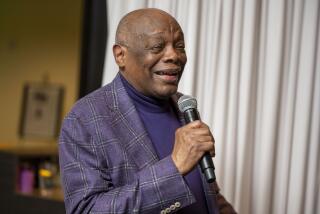SPRING ALBUM ROUND UP : Evolution of the Father of Funk : ***** JAMES BROWN “Star Time” <i> Polydor</i> : <i> Albums are rated on a scale of one star (poor) to five (a classic). : </i>
- Share via
Elvis Presley may have defined rock for most Americans in the ‘50s, but James Brown grabbed hold of the roll in the ‘60s and infused it with such electricity and heat that the music world had to come up with a new name for his combustible rhythm: funk.
This landmark, four-disc CD set--drawn from Brown’s most prized 1956-to-1984 recordings for the Federal, King and Polydor labels--chronicles the evolution of that style, which has been echoed in thousands of recordings just as surely as Brown’s breathtaking dance steps have influenced everyone from Mick Jagger to Michael Jackson.
One of the most revealing things about this set for listeners new to Brown’s music is that there was an evolution at all. Listen to any of the classic Brown hits--from “It’s a Man’s Man’s Man’s World” to “Papa’s Got a Brand New Bag”--and there is such absolute authority and command that it’s hard to picture his ever having stepped up to a microphone without that burning artistic vision.
Not true.
The Macon, Ga., native didn’t break into the national pop charts in a big way until his 1963 remake of “Prisoner of Love,” a pop standard that had been a hit 29 years earlier for crooner Russ Columbo. But he had debuted on the R&B; charts seven years earlier with “Please Please Please.”
“Please” opens this set and it remains a memorable expression of romantic need, but the song was a conventional R&B; ballad. The magic was in the voice--a voice as startingly primitive as Little Richard’s, but somehow even more unshakable in your memory because the anguish and desire seemed so genuine, as opposed to Richard’s trademark flamboyance. Ray Charles may have already given us a taste of sweet soul, but Brown gave us raw soul.
“Please Please Please” was a regional hit, but it didn’t ignite Brown’s career the way you’d expect. Brown spent the next few years working in a variety of mostly conventional settings, only the voice standing as a constant promise of greatness. During this time, he was working on his live act, an all-out demonstration of cold sweat and hot beat.
It was in those shows that Brown’s horn-spiced funk was born, as he and the musicians worked instinctively to produce sounds that were as primal as his vocals and as pulsating as his moves. By the end of the first of these four discs--in the 1962 single “I’ve Got Money” and in the 1964-65 demo versions of “Man’s World” and “I Got You”--Brown is generating the same sparks in the studio, and he seems liberated.
Over the next dozen years, Brown not only made some of the most exciting music of the modern pop era, but, perhaps more than any other entertainer of his generation, he also became the voice of black America--a role he took seriously in such songs as “Don’t Be a Dropout” and “Say It Loud--I’m Black and I’m Proud.”
Brown--who has resumed his career after being released from prison in South Carolina, where he served two years for aggravated assault and failing to stop his car for a law officer--expressed emotions rather than write songs in a traditional sense. But the emotions--often punctuated by uncompromising squeals of desire and delight--opened a door in pop expression so wide that it’s hard to imagine what contemporary music would be like without him.
More to Read
The biggest entertainment stories
Get our big stories about Hollywood, film, television, music, arts, culture and more right in your inbox as soon as they publish.
You may occasionally receive promotional content from the Los Angeles Times.










